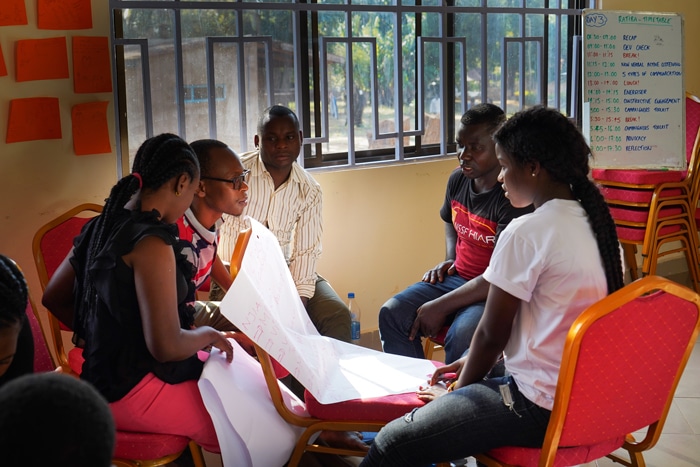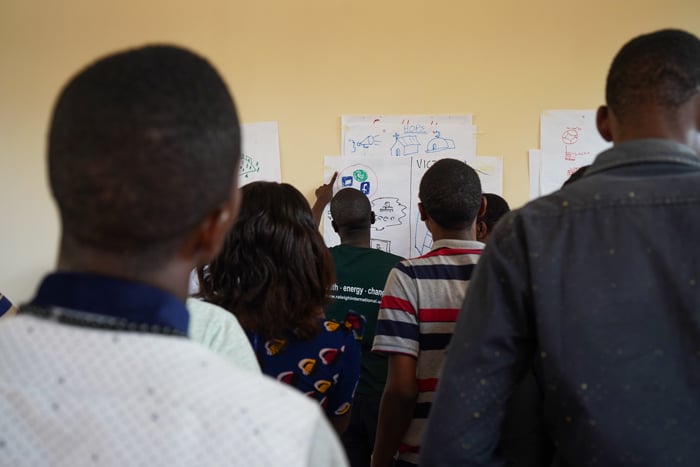Young Tanzanians Train as Leaders in Social Accountability
Home | Venturer Stories |
How does the SAY project work?
Of the 32 individuals that completed their training last Friday, 18 qualified as Youth Cluster Coordinators (YCCs) who will now go on to recruit 180 local youth from 90 communities as Community Monitors (CMs), training and supporting them to gather feedback independently on project delivery.
One of the development projects that will be monitored is the upkeep of hygiene and sanitation facilities that were constructed in healthcare centres around the Dodoma region by Simavi as part of their Mkaji programme. Community Monitors will be checking, for example, whether the new facilities are functioning as intended, if the facilities are open according to the times advertised and whether adequate repairs are being made.

Through innovative reporting systems – such as a smartphone app called DevCheck that uploads data onto a website in real time – the participants will gain an increased ability and confidence to take an active part in projects happening within their communities whilst also encouraging their communities to do the same.
In addition to the 18 YCCs trained last week, 6 young people became SAY Campaign Coordinators (SCCs), who will run inclusive campaigns enthusing marginalised groups and local leaders in additional communities to undertake community-led accountability on future projects. Along with these SCCs, a further 8 young people were trained as reserves, ready to step in as YCCs or SCCs should they be required.
Marginalised groups
A large focus of last week’s SAY training was on the issue of the inclusion of marginalised groups, notably young people, women and the disabled.
There were sessions on how YCCs can ensure inclusion when they raise awareness of the SAY project and recruit and train Community Monitors in their local villages. The teams discussed how factors like time and location can exclude certain groups of people, and planned ways of designing campaigns to include all members of society.
‘I’ve seen the marginalised positions of women and young girls – most of them are alienated in development issues. They don’t get involved because they haven’t been given the same opportunities as men and boys,’ said Valentina A. Kimati, who trained as a YCC last week. ‘Once you give them a chance, they can get more involved. So, I think the SAY project will be positive for the next generation of women.’

Involving youth is of paramount importance in Tanzania, which has one of the youngest populations in the world. It is Raleigh Tanzania’s belief that providing young people with the knowledge, skills and social capital they need is vital for them to support their communities and ensure that their voice is heard.
‘In Tanzania, statistics show that around 65% of the population is youth, but lots of projects in our communities exclude young people,’ commented Frank Sakalani, who became qualified as an SCC. ‘For me it is important to involve youth and other groups, so that much of the community is involved in development work,’ he said.
Not only will the project give younger people an improved voice within society but help them to develop skills that will prove invaluable for their future careers.
‘Young people will be required to approach lots of people – district officials, village leaders, NGO staff, people working in the projects – which we believe will build confidence and help them shape their careers,’ noted Raleigh Tanzania’s Lisa Mungure (Project Officer).
‘It is my dream someday to set up an NGO,’ said YCC Kimati.
‘By training Community Monitors how to follow-up on projects, determine the value of money and find out about how NGOs operate, it will give me the knowledge I need to help me achieve what I dream of doing,’ said YCC Valentina.
Words by Jess Rowbury (Communications Officer, Raleigh Tanzania)
Photographs by Thalia Aboutaleb
Interested in doing an Expedition yourself?
Explore our Expedition resources
Hear directly from Raleigh alumni and get your questions answered.
You’ll find everything in one place about our Expeditions.
Send us an enquiry with what you’d like to know more about.



